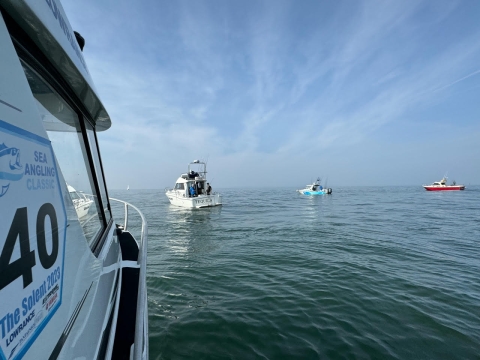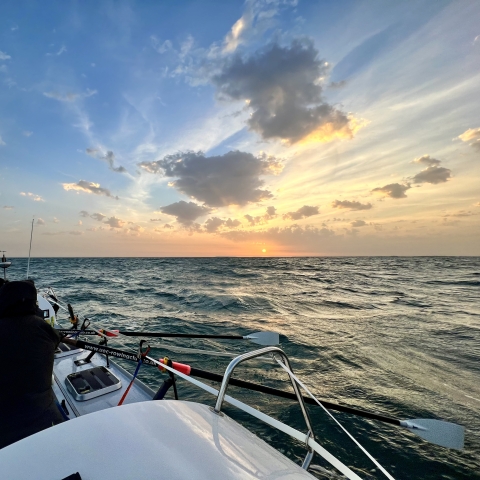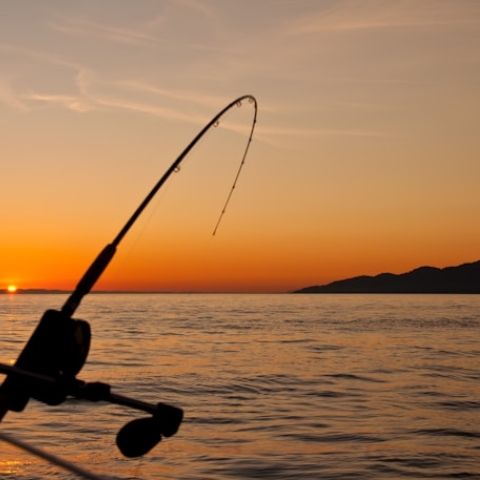

The CAST citizen science project will use data collected from local sea angling competitions to provide a unique insight into the distribution, life stages and habitat preferences of data poor fisheries.
19 June 2024
3 minutes
A new project using recreational anglers to help the UK and the local region’s fishing industry to be more sustainable and productive is launching in the Solent this week.
Competitive Angling as a Scientific Tool (CAST) is a citizen science project that uses data collected from local sea angling competitions to provide a unique insight into the distribution, life stages and habitat preferences of data poor fisheries in the Solent.
It will collect biology, ecology, habitat and genetic data from five groups of fish caught by citizen scientists – sea bass, black sea bream, skates and rays, tope and smooth hound.
The project will use the annual Sea Angling Classic competition, which runs from 20-23 June from Port Solent, to collect the data, test and then develop a standardised, cost-effective and self-sustaining citizen science data collection method.
Researchers from the University of Portsmouth will gather geolocated images of each fish caught (taken by the teams), perform targeted sampling (e.g. DNA swabs), and undertake sonar scans of the fished areas. Together, these will generate a unique dataset for each species on their:
- Biology (species identification, growth, disease condition and reproductive state).
- Ecology and habitat (spatial distribution, habitat utilisation).
- Genetic identification.
Sea fishing is a globally popular activity so recreational anglers are a substantial group of highly motivated and engaged potential citizen scientists. From the data they provide, we hope to be able to build an evidence-based action plan, developed in collaboration with the fishing sector and other stakeholders, to deliver a thriving, sustainable fishing industry and healthy marine environment for generations to come.
Dr Ian Hendy, Senior Lecturer in Marine Restoration and Conservation
By setting up a standardised data collection method that can be repeated in future years, the researchers hope to generate a long-term dataset, which will be essential to manage these five data-poor species/groups for more robust fisheries management plans and conservation. This will also improve future management of essential fish habitat areas to promote species recovery.
New AI software will be further developed to assist with the identification of species based on their morphometrics, size, colouration and other factors with far-reaching applications outside of this project.
Dr Ian Hendy, Senior Lecturer in Marine Restoration and Conservation and project lead at the University of Portsmouth, said: “For many UK target species, ecological and biological data to make evidence-based decisions are limited, which can lead to unsustainable catches. Collecting these data requires significant investment (people and money) with one increasingly popular approach that uses members of the public (citizen scientists).
“Sea fishing is a globally popular activity so recreational anglers are a substantial group of highly motivated and engaged potential citizen scientists. From the data they provide, we hope to be able to build an evidence-based action plan, developed in collaboration with the fishing sector and other stakeholders, to deliver a thriving, sustainable fishing industry and healthy marine environment for generations to come.”
The project, involving the University of Portsmouth, Angling Spirit and the Southern Inshore Fisheries and Conservation Authority, was awarded over £560,000 from UK Department for Environment, Food and Rural Affairs under the Fisheries Industry Science Partnerships (FISP) scheme.
Other stories you may be interested in
University showcases marine restoration work as part of The Wildlife Trust’s annual conference
6 June 2024
3 minutes

Two teams to embark on epic 2,000 mile row around Great Britain for ocean research
Two teams of ocean rowers will set off on a 2,000 mile rowing challenge around the entire coast of Great Britain this weekend, and they’re both aiming for Guinness world records.
4 June 2024
6 min read

Angling fish for food: 11 per cent of world’s freshwater fish caught by amateurs
17 May 2024
8

